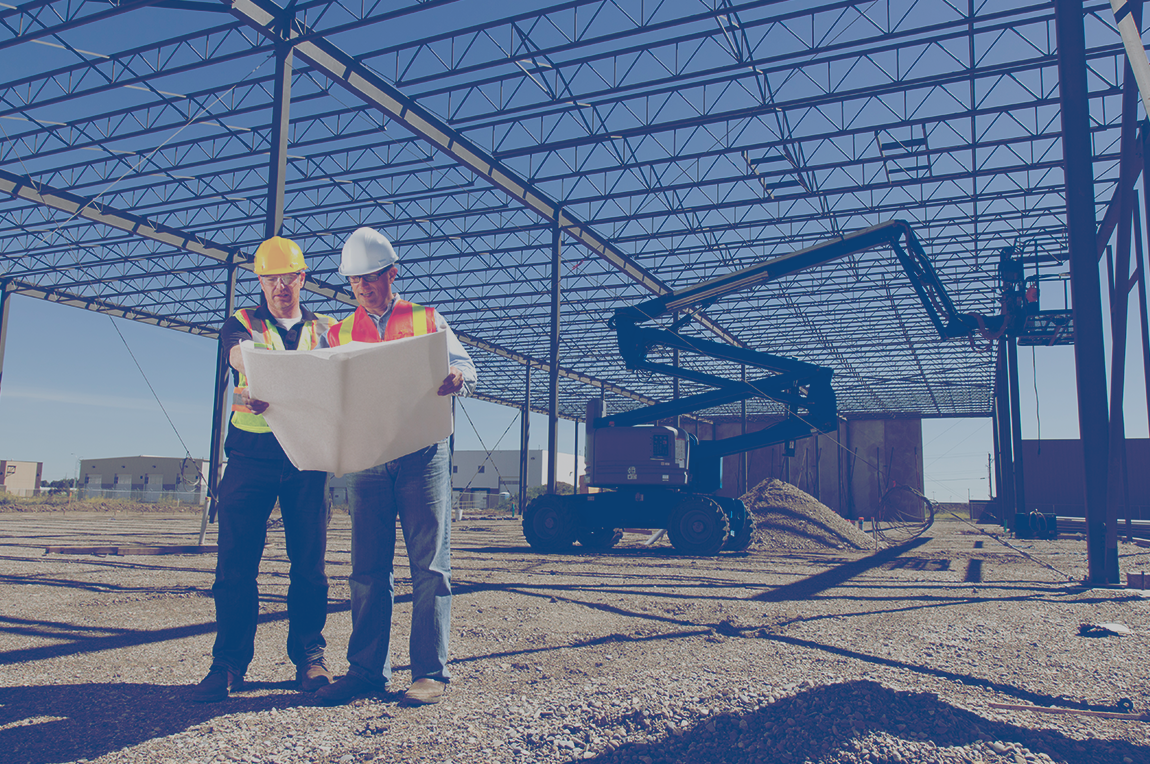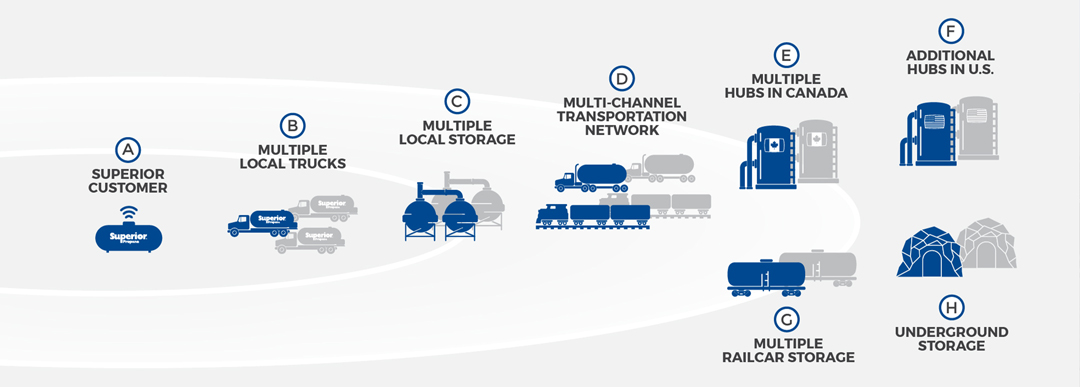Propane for Power Generation:
Why diesel is on the decline
Propane may be one of the best kept secrets in power generation. But that’s soon to change with shifts in market forces like new emission rules and greater awareness of operational savings.
Harnessing Propane Power
Costs have dropped and demand has heightened for petroleum-based fuels with improvements in exploration and extraction. But not all of these fuels are created equal—especially when it comes to price and environmental impact. Known for its versatility and ranking among the cleanest fuels, propane has a long history of use in homes and across various industries, predominantly in heating and back-up power applications. Despite being underutilized traditionally, propane's role in the energy market is gaining momentum as options for its power usage continue to diversify and regulatory forces shift in its favour.
“Recognized for its low environmental impact by Canada’s Alternative Fuels Act,
propane is one of the cleanest and most versatile fuels in existence.”
Source: Canadian Propane Association
Expanding the Scope of Propane: From Traditional Heating to Efficient Power Generation
For years, industries like mining and construction have relied on propane for heat. While they continue to do so, you may be surprised to learn these operations are expanding their use of propane into power generation. They see it as a way to lower overall energy costs, not just for heat, but to power lights, equipment and processes.
Use of propane in power generation will continue to expand due to its lower government carbon tax rate compared to other higher emission fuels. Price is only one consideration. Fuel availability is another and propane excels given that it is abundant and can be secured across Canada, including in remote regions where natural gas pipelines do not extend.
In the Reference Case of a recent report, the National Energy Board (NEB) projects Canada’s propane production will increase 63% from 2017 to 2040. Most production growth will be from increased natural gas production, because most of Canada’s propane supply comes from processing natural gas.
Propane is growing in power generation applications within various industries as many operations realize the feasibility and savings of retrofitting existing generators to bi-fuel utilizing propane. Propane offers other benefits as well that have yet to be fully realized by all industries. Below, we discuss the historical and emerging advantages of propane use in power generation.
Unveiling Propane: Economic, Versatile, and Clean
Businesses must consider several factors when deciding which fuel is best. Here is how propane compares to other fuel options against three important metrics.
Propane Power Generation—An Economic Choice
In contrast to diesel, propane exhibits a striking stability in its pricing trends. This makes it a reliable fuel for budget planners to forecast precise spending estimates. Historically cheaper than diesel, propane operators have saved up to 40% in fuel costs alone.
Since propane is much easier and less expensive to compress, ship, and store, many businesses realize it is a logical economic choice for their power needs.
In fact, businesses may be surprised to learn about the true lifecycle costs of differing fuels. Over the life of the engine, propane provides a shorter payback period than most diesel power systems. Its true cost advantage stems from its lower fuel and operating costs, less particulate ending up in the crankcase, fewer filters and fluids, and less engine downtime and maintenance.
These advantages, along with its longer lifespan, result in a faster payback on equipment.
“We now have reliable power that’s affordable.”
Steve Robinson
General Manager, AgriMarine
Bi-fuel power generators save companies money
Existing generators can easily be modified to incorporate propane and create a bi-fuel system. There are no large capital costs required for businesses to take advantage of propane’s benefits. Some dealers offer bi-fuel retrofit kits. No internal modification is required to convert a diesel engine—the conversion kit is a complete stand-alone system.
While pure propane power gaseous engines utilize 100% propane, bi-fuel engines operate on a mix of 40% propane and 60% diesel fuel. Bi-fuel generators have lower maintenance and fuel costs, and a longer lifespan than diesel. Whatever the work setting, propane offers favourable return on investment, reduced risk, ease of conversion, and lower operating costs than most alternative fuels. And propane-fueled equipment needs fewer costly service visits.
Available For Remote Locations
For sectors such as mining, construction, agriculture, and forestry, which necessitate a portable fuel that can be transported to remote regions, propane proves an excellent option. It's abundant, readily available, and eliminates the need for pipelines or expensive infrastructure.
And unlike diesel, propane never goes bad. It can be stored in tanks without worrying about fuel degradation or contamination, which can compromise performance or damage equipment – a costly risk.

COST-EFFECTIVE HEAT
Aggreko and Superior Propane provides reliable and cost-effective heat and power to a 400,000 square foot construction building. “A propane fuel supply was vastly more economical than going with a fuel source such as diesel. Just comparing fuel to fuel, propane offered
Minimizes downtime in tough environments
In many industries, downtime is unacceptable. It could mean lost revenue or insufficient essential services.In harsh climate conditions, concerns about electric grid outages could significantly impact production costs. Propane is a proven robust fuel in severe northern climates. In fact, propane engines are generally easier to start up in cold temperatures than diesel engines. That’s one of the reasons using propane in remote camps for heat based applications is preferred.
PROPANE RANKS HIGH IN VERSATILITY
Because of its natural advantages over other similar fuels, many businesses are turning to propane:- Utilities, forestry, mining, and remote construction sites
- Vehicles—commercial mowers, trucks, taxis, school buses vans and government fleets like police & ambulance
- Manufacturing, warehousing and factory equipment such as forklifts
- Agriculture and aquaculture—orchards, fishponds and barns; power irrigation systems, outer buildings and grain dryers
- Combined Heat & Power (CHP)—commercial buildings, greenhouses
Propane is versatile for applications across various industries, but it has specific value in remote industries like mining and construction. It can fuel mine smelting furnaces, mine air heaters, kilns, ore dryers, crucibles and boilers.
It also serves general power generation needs such as cooking and powering individual cutting tools. Propane is also an ideal single source fuel in the construction industry. Its many uses include powering generators, construction heaters, brick kilns, steam generation, forklifts, cranes and a multitude of power equipment.
Environmentally Clean and Safe
Industry regulations have required businesses to become more accountable for the environmental impact of their operations. As a clean-burning fuel, propane assists industries in reducing overall carbon emissions—an especially crucial consideration when operations are in proximity to residential communities.
While natural gas burns slightly cleaner, as a greenhouse gas (methane) it is 20 times more harmful than carbon dioxide when released in an unburned state. The Canadian Propane Association also notes that propane emits 60% less carbon monoxide than gasoline, 98% less particulate matter than diesel and contains virtually no acid rain producing sulphur.
Burning propane also produces lower levels of air toxins such as benzene and acetaldehyde, than either gasoline or diesel. The federal government carbon pricing mandate has heightened the importance of considering environmental impact when choosing a fuel. Carbon pricing varies in each province; either through a direct tax on carbon or through a carbon cap and trade system.

CARBON EMISSIONS
Because there are fewer carbon emissions from consuming propane versus other fuels like diesel, it must be given a lower emission cost in government carbon pricing programs. Propane is a readily-available and affordable solution to reducing greenhouse gas emissions and can help meet the carbon reduction targets of all provinces.
Propane Is a Safe Choice
Propane is a safe fuel for multiple applications including hospitals, schools and vehicle fleets. Propane actually has a narrow range of flammability. This means that the propane/air mix must contain from 2.2% to 9.6% propane vapor to ignite. Any less than that and the mixture is too lean to burn; any more than that and the mixture is too rich to burn. Also, propane won't ignite when mixed with air unless the ignition source reaches a temperature. In contrast, gasoline will ignite when the source of ignition reaches 430F to 500F.
Environmental Tax Incentives
Government environmental tax incentives is another reason propane proves to be a superior choice. In an effort to mitigate the effects of climate change, highly polluting fuels in Canada are generally taxed at a higher rate than cleaner fuels like propane. Further, the federal government is considering instituting a Clean Fuel Standard that would require a 10 to 15 per cent reduction in the carbon intensity of fuels used throughout the economy, including industry, transportation, and buildings. That could be achieved by mixing more renewable fuel like ethanol into gasoline or switching to lower-carbon fuels such as biofuels, natural gas, propane and electricity. Under the terms of these acts, propane is considered one of the cleanest petroleum-based fuels on the market. According to the Canadian Propane Association, its greenhouse gas (GHG) emissions are significantly lower than gasoline, diesel, coal and heating oil, and comparable to natural gas.Make the Switch
Many industries stand to gain from a better understanding of the cost savings, flexibility, safety, and environmental benefits of propane. The recent federal carbon emissions regulations further impacts fuel choices for Canadian businesses. As energy demands continue to rise and possible additional emissions regulations are introduced, operators are wise to take another look at the business value of propane power solutions.Contact Canada's Leading Propane Supplier

OR
Call Us Now at
1-855-965-4855



